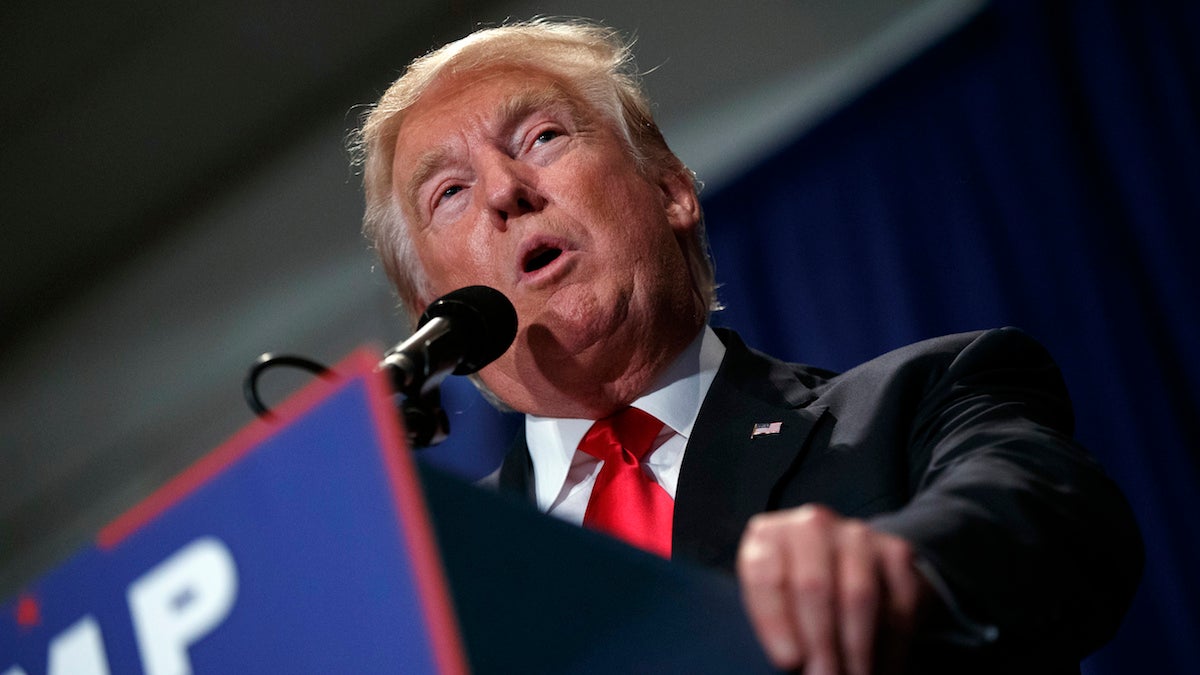Trump rhetoric on Pa. voting could widen the rift between blacks, police

Republican presidential candidate Donald Trump speaks during a campaign rally
Police in Milwaukee shot and killed a man in a black community this weekend, sparking protests although police say 23-year-old Sylville K. Smith was armed when he was shot.
In another community, at another time, citizens might be more willing to believe the official account. But on the heels of numerous high profile police shootings of black men, women and children, African Americans are particularly mistrustful.
Still, there are many of us working feverishly to repair the rift created by the disparate treatment of blacks by some police. That’s why it’s so troubling to watch Donald Trump attempt to widen the chasm between us.
With his call to use police as poll monitors in select Pennsylvania communities, Trump is not only touting police as a potential tool of intimidation against voters of color. He is seeking to exploit the historical fault lines that cause many blacks to view police as enforcers of systemic racism.
At a time when Washington Post data show that police disproportionately kill blacks, and the U.S. Justice Department documents institutional racism in police departments from Ferguson to Baltimore, the voting booth is one of the few places where blacks feel truly free from the specter of police mistreatment.
We must not allow Donald Trump to take that away. And make no mistake. On Election Day, if his rhetoric is to be believed, that is what Trump will attempt to do.
“We have a lot of law enforcement people working that day,” Trump said at a Friday rally in Altoona, Pennsylvania. “We’re hiring a lot of people. We’re putting a lot of law enforcement — we’re going to watch Pennsylvania, go down to certain areas and watch and study, and make sure other people don’t come in and vote five times.”
This rhetoric about “other people,” clothed in the false narrative of protecting the integrity of the vote, targets Democratic areas like Philadelphia where voters of color hold sway. By threatening to use police to monitor voters, Trump not only ignores the numerous studies proving that voter fraud is virtually nonexistent. He also resurrects the history that created the enmity between African Americans and law enforcement.
From the use of slave patrols in the South to violently control and oversee the movement of enslaved and free Africans during the antebellum era, to the rise of formalized police departments in the North, blacks have seen government-sanctioned injustice meted out with brutal efficiency.
Even when blacks attempted to change that reality by using their federally guaranteed right to vote, they were met with brutality. And that violence wasn’t limited to the South. In fact, one of the most poignant examples of the intermingled history of racism, policing and the electoral process occurred right here in Philadelphia.
In 1871, Octavius V. Catto was a leader in Philadelphia’s black community; one who believed in full citizenship for African Americans. A supporter of the Republicans, then the progressive party of Lincoln, Catto registered blacks to vote. On October 10, Election Day, the Democrats responded by encouraging gangs of white thugs to roam the black community in an effort to depress black turnout.
Numerous historical accounts say Frank Kelly, a white Democratic Party operative, shot Catto dead that day. Catto’s body was carried to the police station, though doing so had little affect, since historical accounts say police, many of whom were Irish immigrants who supported the Democrats, refused to provide protection for black residents.
The injustice did not end there, however. Kelly, who ran for years as a wanted fugitive, was finally apprehended and stood trial. Despite the testimony of several eyewitnesses at trial, Kelly, in a final insult to the black community, was acquitted of Catto’s murder by an all white jury.
Maybe Donald Trump is aware of the troubling history surrounding white mobs being called upon to monitor black voting in Philadelphia. Or perhaps he’s more familiar with later incidents in the South where Jim Crow laws were brutally enforced by white segregationist sheriffs like the notorious Bull Connor.
Whatever his familiarity with the past, it’s clear to me that Trump has an alarming perspective on the future.
Trump sees a future where blacks are subjected to special scrutiny.
Trump sees a future where discrimination is codified by law.
Trump sees a future where policing maintains inequities.
Trump sees a future like the past.
In a time when police and communities of color must come together to repair hundreds of years of mistrust, no leader should be calling for actions that push us further apart.
That’s especially true when it comes to the vote–a right every American must safeguard.
Listen to Solomon Jones mornings from 7 to 10 am on 900 AM WURD
WHYY is your source for fact-based, in-depth journalism and information. As a nonprofit organization, we rely on financial support from readers like you. Please give today.


